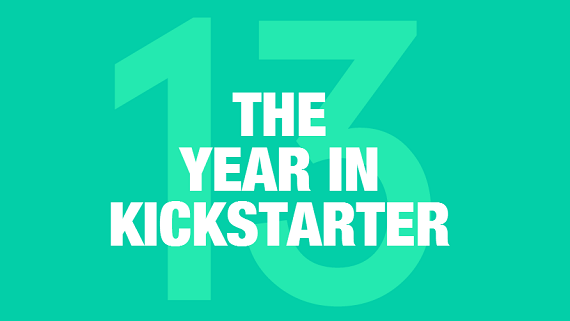
2013 may have been a controversial year for Kickstarter, especially when it came to established names turning to the service for funding. But it was still very, very successful.
The crowdfunding site has released its performance stats for the past year, and they are impressive,
In all, the company saw three million people, from a total of 214 countries and every continent, pledging a total of $480 million to Kickstarter projects in 2013. In case you were wondering how that breaks down, Kickstarter did the math for you: it is $1,315,520 a day or $913 every minute.
Yowza. I’d like to make that kind of cash!
The total number of projects funded in 2013 was 19,911. (You know Kickstarter has to be kicking itself right now for just not making it to that 20,000 mark!)
All of those numbers are up from 2012, when Kickstarter saw $319 million pledged by 2.24 million people, with 18,109 successfully funded project.
In all, 807,733 people donated to more than one project this year, while 81,090 backed 10 or more projects, and a total of 975 people backed more than 100 projects.
Kickstarter also outlined some of its most successful graduates this year, which includes the shipmentof the Pebble smartwatch in July, after it became the most successful Kickstarter project ever in 2012, raising $10.3 million from nearly 70,000 backers.
The company also highlighted the release of gaming console Ouya, which raised almost $8.6 million from over 63 thousand backers. The company also raised $15 million in funding from Kleiner Perkins Caufield & Byers, Mayfield Fund, NVIDIA, Shasta Ventures, and Occam Partners in May.
Other highlights included a Delorean hovercraft that cruised the San Francisco Bay, an emoji translation of Moby Dick that made it into the Library of Congress, and Kickstarter making it as a question on Jeopardy.
2013 controversy
As good a year as Kickstarter had, I feel that I would be remiss if I didn’t mention some of the controversy that Kickstarter encountered in 2013 as well, mostly stemming from celebrities who used the site to fund their projects.
It all started when Rob Thomas, the creator of cult TV show Veronica Mars, started a Kickstarter campaign in an attempt to get a film of the show made. The initial goal was set at $2 million, which was met within 10 hours of the start of the campaign. The project actually wound breaking the record as the fastest project to reach first $1 million, then $2 million.
The Kickstarter campaign ended on April 13, with 91,585 donors raising $5,702,153. A small, little-loved TV show had come back from the dead because the fans wanted it to. And all felt right with the world.
Then came Zach Braff, who was able to raise $3,105,473 from 46,520 backers, after setting a goal of $2,000,000 for his new film called Wish I Was Here. And all hell broke loose.
Celebrities turning to Kickstarter sparked such a major conversation about who the site is actually for that even company founders Perry Chen, Yancey Strickler, and Charles Adler, were forced to weigh in. Theydefended big name projects, and even went so far as to say that they also help fund other projects on the site.
“The Veronica Mars and Zach Braff projects have brought tens of thousands of new people to Kickstarter. 63% of those people had never backed a project before. Thousands of them have since gone on to back other projects, with more than $400,000 pledged to 2,200 projects so far. Nearly 40% of that has gone to other film projects,” they said in a blog post entitled “Who is Kickstarter for?”
That didn’t stop director Spike Lee from also turning to the site. He was able to surpass his goal, eventually raising $1.4 million from 6.4 thousand people. But Lee also had to defend himself against charges that he was taking funds away from smaller projects that needed it more.
This is not a controversy that will be going away anytime soon; in fact, with crowdfunding becoming mainstream, it’s likely that even better known people and projects will wind up on the site in coming years.
(Image source: http://www.kickstarter.com/year/2013)


















